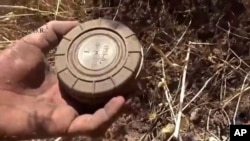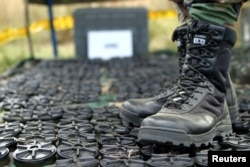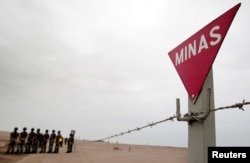When Labibah Abdo Saif was 9 years old, she stepped on a land mine while walking to school in Yemen. She lost her right leg and part of her right arm, and she had horrible facial injuries. Her family members were forced to sell all of their belongings to pay for her medical care. She was flown to Italy for treatment of her facial injuries.
Refusing to give up and overcoming enormous obstacles, Labibah now works for the Yemeni Association of Landmine Survivors and the Ministry of Social Affairs to help others.
Alvin Madjesty is not just a dog — he is also a lifesaver. Since 2011, he and his handler, Lance Corporal Nawarathne, have cleared 70,000 square meters of mine-affected land in Sri Lanka.
Labibah, Alvin and Lance were among those honored Wednesday by the Marshall Legacy Institute, a nonprofit organization that partners with the State Department to help war-torn countries and to eliminate destabilizing effect of land mines.
Far fewer incidents
As recently as 15 years ago, land mines and explosive remnants of war killed or injured nearly 10,000 men, women and children every year. But that figure has "dropped by more than 60 percent" after concerted efforts by nations and nongovernmental organizations, said David McKeeby, spokesman for the State Department's Bureau of Political-Military Affairs.
According to the State Department, the United States is the world's largest financial supporter of efforts to clear unexploded ordnance and land mines. It has contributed more than $2.6 billion to more than 95 countries since 1993 to reduce the harmful worldwide effects of at-risk, illicitly trafficked and indiscriminately used conventional weapons of war.
While the U.S. stopped the export, production and acquisition of antipersonnel land mines, it still retains land mines for use on the Korean Peninsula, where Washington is required for the defense of South Korea against North Korea.
But critics said Washington could do more to clean up land mines, cluster munitions and other highly explosive ordnance in many countries where its military inflicted damage.
Quicker action sought
The U.S. should "more quickly destroy its land mine stockpile and remove the last policy hurdles in order to allow U.S. accession to the Mine Ban Treaty," said Firoz Alizada of the International Campaign to Ban Land Mines-Cluster Munition Coalition in Geneva.
The Mine Ban Treaty, adopted in 1997 and entered into force in 1999, is a legally binding international agreement that bans the use, production, stockpiling and transfer of antipersonnel mines. It also places obligations on countries to clear affected areas, assist victims and destroy stockpiles.
The U.S. has participated as an observer in meetings of the Mine Ban Treaty for years, and it has pledged to eventually join the treaty. Advocates have called on President Barack Obama to insist that the Pentagon study into alternatives be completed swiftly so that the Korea exception can be removed before he leaves office.
Alizada told VOA on Thursday that countries would gather to discuss progress and challenges in implementing the treaty next month in Chile, and to reaffirm the goal of completing mine clearance by 2025.
Yemen is among the war-torn countries that have been contaminated with land mines and unexploded ordnance (UXO) because of various violent conflicts since 1962, including a civil war in 1994 and persistent clashes between tribal actors and the government. The current conflict between Houthi rebels and the Sunni-led government has also complicated de-mining efforts.
Conflict in Sri Lanka
Sri Lanka's land mine and UXO contamination is a result of more than three decades of armed conflict between the government and the Liberation Tigers of Tamil Eelam, which campaigned to create an independent state in the north and east of Sri Lanka for the Tamil people.
The government of Sri Lanka has announced its goal to be mine-impact-free by 2020.
When Obama visited Laos in September, he announced $90 million in funding for a national survey of unexploded ordnance and for clearance efforts.
The U.S. and Norway also raised $107 million for de-mining in Colombia during the margins of U.N. General Assembly meetings in September.







